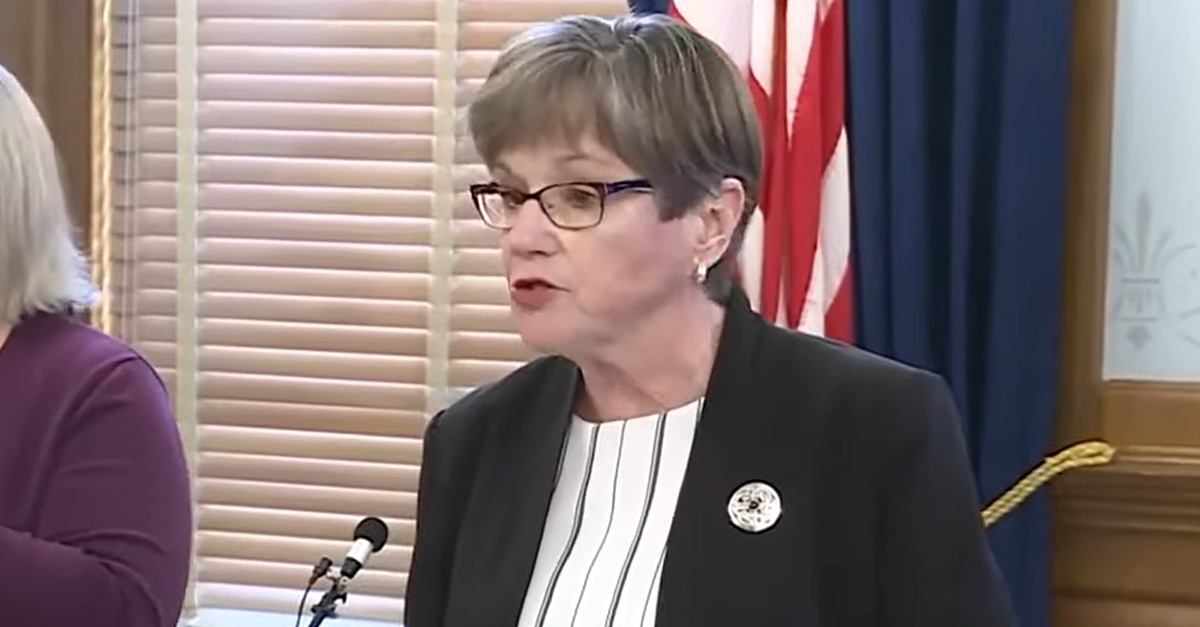
While Attorney General William Barr licks his chops figuring out how to “jawbone” the states, Kansas’s Democratic Gov. Laura Kelly is trying to get a lawsuit filed against her by churches tossed out.
The churches, the First Baptist Church of Dodge City, Kan., and Calvary Baptist Church of Junction City, Kan., filed suit, noting their sincere belief that “the Bible teaches the necessity of gathering together for corporate prayer and worship and that such assembly is necessary and good for the Church and its members’ spiritual growth.” The plaintiffs claimed that Kelly’s executive orders restricting in-person gatherings — and threats of criminal penalties violated their First Amendment rights to worship according to the dictates of their own consciences.
Trump-appointed federal judge John W. Broomes responded by issuing a temporary restraining order against parts of the governor’s orders while also handing down more than a dozen safety-oriented bullet points for the churches to follow. Broomes called the Kelly executive orders “state-imposed restrictions on religious exercises that are not narrowly tailored to further the compelling governmental interest in halting the spread of COVID19.”
“[C]hurches and religious activities appear to have been singled out among essential functions for stricter treatment,” the judge continued, saying that “airports, childcare locations, hotels, food pantries and shelters, detoxification centers, retail establishments” (and so on) had more leeway.
On Wednesday, Gov. Kelly moved to toss the case on a technicality.
Kelly’s lawyers said Judge Broomes “raised concerns” during a Tuesday phone conference about the court’s “subject matter jurisdiction and ordered [a] briefing.” The lawyers, Pedro L. Irigonegaray and Lumen N. Mulligan, argued that the judge should stay the temporary restraining order until the subject matter jurisdiction question was answered. Judge Broomes denied that, but the lawyers pushed once again for a stay.
“In light of the additional legal authorities in this written motion, which were not before the Court at the April 21, 2020 conference, Defendant respectfully renews its motion to STAY the TRO during the pendency of this jurisdictional inquiry,” the defendant asked. “Defendant also respectfully prays that this Court DISMISS this entire case for lack of subject matter jurisdiction under the Eleventh Amendment; or in the alternative, DISMISS Plaintiffs’ Count IV for lack of subject matter jurisdiction under the Eleventh Amendment, and DISMISS the remainder of the Complaint for lack of subject matter jurisdiction as moot.”
Count IV of the complaint against Kelly, unlike the other counts that alleged violations of the U.S. Constitution, alleged that the governor violated the The Kansas Preservation of Religious Freedom Act.
The governor’s legal team is arguing, at least in part, that the judge doesn’t have jurisdiction to hear the state law claim:
Additionally, this Court lacks jurisdiction to grant Plaintiffs’ state-law-based relief. See Complt. at ¶ 77-83. Even if this Court holds that the Ex parte Young exception applies to Plaintiffs’ federal claims against Governor Kelly, it does not apply to their state law causes of action.
But that might be a long shot because federal judges are not barred from hearing such claims (see: supplemental jurisdiction). On the other hand, the Pullman abstention doctrine might apply to the state law claims, but the governor’s legal brief did not make any mention of that.
The bulk of the rest of the Kelly’s argument hinges on the idea that the plaintiffs sued the wrong person.
The Eleventh Amendment bars Plaintiffs’ suit. The Eleventh Amendment generally bars suits against a state in federal court commenced by citizens of that state or citizens of another state. See Hans v. Louisiana, 134 U.S. 1, 13–15 (1890). In Ex parte Young, however, the Supreme Court held that the Eleventh Amendment does not bar a suit against a state official in federal court that seeks only prospective equitable relief for violations of federal law. See 209 U.S. 123, 159–60 (1908). This exception is predicated upon the state official having “some connection” with the enforcement of the challenged state action.
That’s a fancy way of saying: sue the people who infringed on your rights by enforcing Kelly’s orders.
Laura Kelly motion to dismiss by Law&Crime on Scribd
Aaron Keller contributed to this report.
[Image via screen grab from KMBC-TV/Kansas City.]